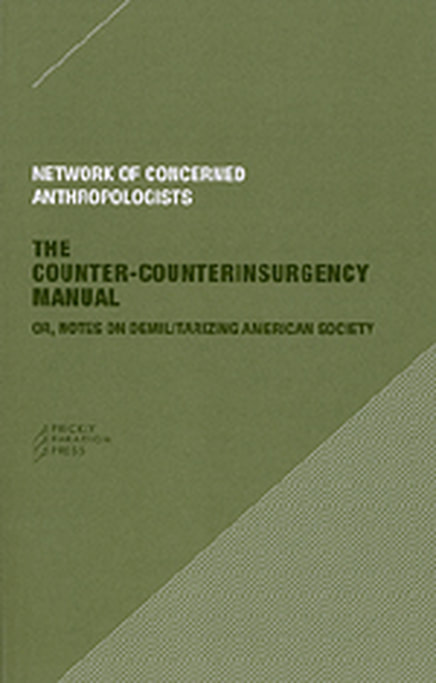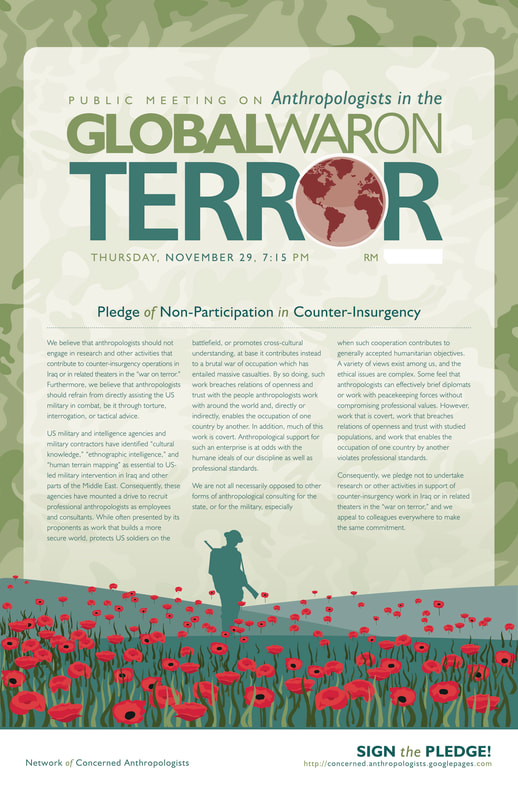Network of Concerned Anthropologists
|
|
Militarization: A Reader offers a range of critical perspectives on the dynamics of militarization as a social, economic, political, cultural, and environmental phenomenon. It portrays militarism as the condition in which military values and frameworks come to dominate state structures and public culture both in foreign relations and in the domestic sphere. Featuring short, readable essays by anthropologists, historians, political scientists, cultural theorists, and media commentators, the Reader probes militarism's ideologies, including those that valorize warriors, armed conflict, and weaponry. Outlining contemporary militarization processes at work around the world, the Reader offers a wide-ranging examination of a phenomenon that touches the lives of billions of people.
In collaboration with Catherine Besteman, Andrew Bickford, Catherine Lutz, Katherine T. McCaffrey, Austin Miller, David H. Price, David Vine Praise“This wonderfully innovative, distinctive, and timely book has the additional value of taking an anthropological approach to militarism. Its editors have been among the key actors in crafting sharp and valuable critiques of the creeping militarization of their disciplines, particularly as practiced by U.S.-based scholars. This volume offers some of the most cogent explorations of the many-layered workings of militarism.” — Cynthia Enloe, author of Globalization and Militarism “Militarism's reach extends far beyond the weapons and armed police and soldiers prowling our streets and deployed around the world, as its rhetoric normalizes violence and war. This deeply intersectional collection insists on the vantage point of militarism's victims, historically and today, while exposing those who profit from it. This volume provides an astonishingly comprehensive introduction to the globalized systems threatening not only individuals, but whole nations, peoples, and cultures, all captured by a profoundly militarized United States.” — Phyllis Bennis, Institute for Policy Studies, author of Understanding ISIS and the New Global War on Terror The Counter-Counterinsurgency Manual Or, Notes on Demilitarizing American Society At a moment when the U.S. military decided it needed cultural expertise as much as smart bombs to prevail in Iraq and Afghanistan, the Pentagon’s Counterinsurgency Field Manual offered a blueprint for mobilizing anthropologists for war. The Counter-Counterinsurgency Manual critiques that strategy and offers a blueprint for resistance. Written by the founders of the Network of Concerned Anthropologists, the Counter-Counterinsurgency Manual explores the ethical and intellectual conflicts of the Pentagon’s Human Terrain System; argues that there are flaws in the Counterinsurgency Field Manual (ranging from plagiarism to a misunderstanding of anthropology); probes the increasing militarization of academic knowledge since World War II; identifies the next frontiers for the Pentagon’s culture warriors; and suggests strategies for resisting the deformation and exploitation of anthropological knowledge by the military. This is compulsory reading for anyone concerned that the human sciences are losing their way in an age of empire. The Network of Concerned Anthropologists Steering Committee consists of: Catherine Besteman, Andrew Bickford, Gregory Feldman, Roberto González, Hugh Gusterson, Gustaaf Houtman, Jean Jackson, Kanhong Lin, Catherine Lutz, David Price, and David Vine. |
David Vine's Writing about Anthropologists and the Military
"Alternatives to Militarization," in Militarization: A Reader. Durham, NC: Duke University Press, 2019.
The Counter-Counterinsurgency Manual--Or, Notes on Demilitarizing American Society, with Network of Concerned Anthropologists Steering Committee. Chicago: Prickly Paradigm Press, 2009.
"Proposals for a Humanpolitik: Building a New Human-Centered Foreign Policy," in The Counter-Counterinsurgency Manual, 2009.
"Enabling the Kill Chain," Chronicle of Higher Education, November 30, 2007:B9-10.
The Counter-Counterinsurgency Manual--Or, Notes on Demilitarizing American Society, with Network of Concerned Anthropologists Steering Committee. Chicago: Prickly Paradigm Press, 2009.
"Proposals for a Humanpolitik: Building a New Human-Centered Foreign Policy," in The Counter-Counterinsurgency Manual, 2009.
"Enabling the Kill Chain," Chronicle of Higher Education, November 30, 2007:B9-10.


